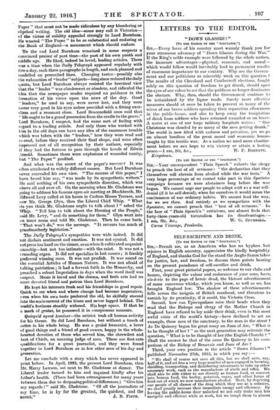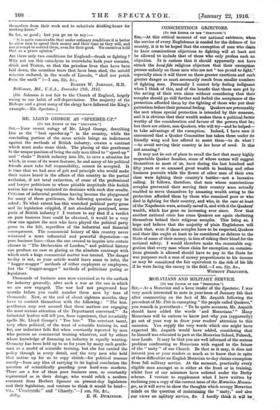SELF-SACRIFICE AND DRINK
[To THE EDITOR OF THE n SPECTATOR:1
Sin, Permit me, as an American who has no hyphen but rejoices in English ancestry, appreciates the kindly hospitality of England, and thanks God for the stand the Anglo-Saxon takes for justice, law, and freedom, to discuss three points bearing on the present paradoxes of self-sacrifice and drink.
First, your great pictorial papers, so welcome to our clubs and homes, depicting the valour and endurance of your sons, have, vis-&-vis to the page of heroic dead, the blatant advertisement of some cancerous whisky, which you know, as well as we, has brought England low. The shadow of these advertisements falls across the insignia of British manhood, and threatens to tarnish by its proximity, if it could, the Victoria Cross.
Second, how can Episcopalians raise their heads when they read that the Bishops and clergy of the Mother Church in England have refused to lay aside their drink, even in this most awful crisis of the world's history—have declined to set an example, these men of the sanctuary, to the man in the street ? As De Quineey began his great essay on Joan of Arc, " What is to be thought of her ? " so the next generation may reiterate the question, " What is to be thought of her (the English Church) ? " Shall the answer be that of the same De Quincey in his com- parison of the Bishop of Beauvais and Joan of Arc ?
Third, your own position in the article " Down Glasses ! " published November 27th, 1915, in which you say:- " We shall of course not save all this, but wo shall save, say, half of it, and set free a very large number of men engaged in brewing, distilling, transporting, and distributing intoxicants to take up other necessary work, such as the manufacture of shells and rifles. We shall also be able either to use directly as human food, or convert into human food, the barley, potatoes, sugar, and other forms of food out of which we now manufacture alcohol. Next, by depriving our people of all classes of the drug which they use as a sedative, we shall greatly increase their immediate energy and efficiency. By leaving the public-house door unlocked we not only mako mon less energetic and efficient while at work, but we tempt thorn to absent
themselves from their work and to substitute drinking-hours for working-hours."
So far, so good ; but you go on to say :— " It is quite conceivable that under ordinary conditions it is better to allow men to spend their money and their time as they will, and not attempt to control them, even for their good. We ourselves hold that as a peace opinion."
Arc there only two conditions for England—drunk or fighting 7 Why not use this cataclysm to overwhelm both your enemies, drink and Teuton, so that the priceless lives that have been laid down, the countless tears that have been shed, the untold miseries endured, in the words of Lincoln, " shall not perish from the earth " 1-1 am, Sir, &c.,
ROBERT W. JOHNSON, M.D.
Baltimore, Md., U.S.A., December 28th, 1915.
[Dr. Johnson is not fair to the Church of England, largely owing to our habit of self-depreciation. The majority of the Bishops and a great many of the clergy have followed the King's example.—En. Spectator.]



































 Previous page
Previous page